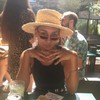Was Jesus Gay? Hmm, it’s an interesting question. Maybe it can be answered through this:“Jesus was unmarried which was very unusual, especially for a rabbi. People have tried to explain this by suggesting that he loved Mary Magdalene or that he was too busy. But he did spend a lot of time around men and there was one man that he loved more than anyone else. Described multiple times as a disciple whom Jesus loved, John’s relationship with Jesus was deeply intimate.”It’s the introduction to a lesson from the TikTok-based Rainbow History Class, an account that fills the gaping hole of missing LGBTQIA+ stories with often-times playful and informative facts. Lessons range anywhere from, “Isaac Newton was likely Ace [Assexual]” to “Why Horror movie monsters seem Queer”, and my personal favourite, “The US military tried to make a bomb that turned enemies gay.”Two great minds sit behind the project, Rudy Jean Rigg and Hannah McElhinney. In 2021, with a shared belief that present queer history revolved only around the negative, they looked to TikTok to create a class where people around the world could see more of a positive queer history in the mainstream.“The inspiration really just came from our experiences in high school, or lack thereof, and realising that we knew nothing about our community,” Rigg told VICE.“We knew nothing about queer people in history in general. And we only knew the really horrible, disgusting things that had happened to us too.” If you’re wondering where the inspiration comes from for their lessons, their research springs out of a personal curiosity of their mutual interests. They’ll sit and ponder…Why do gay people like iced coffee? Were Vikings bottoms? What about Marie Antoinette? Was she a lesbian?“We just sit there and we get curious about stuff,” says Rigg.“Like, I wonder…where are all the trans people in electronic music? Or, you know, pirates, people love pirates. Is there anything queer about that? And then we sort of dig into it. So we just look at things and we go, was there anything queer about it? And sort of discover things from it.”Sometimes, as with “Was Jesus Gay?” their topics can often stoke “mainstream” audiences – stuck in their ways – into discomfort. But that is the role of Rainbow History Class: to bring something new and undiscovered to the table.“Look, we're here to start conversations and to get people curious,” says Rudy.“So of course, there's always going to be difficult conversations to be had, particularly when it comes to colonisation and things like that…The internet loves it. They love to hate and love to love…But in terms of people running up and shouting things across the street to me – which happens more than you'd expect – people are really grateful to be represented, whether that's through the representation that I bring, or that Hannah brings.”The ethos of Rainbow History Class stems from the global-nature of stories that aren’t purely told from a Western perspective. Every few weeks a “substitute teacher” will take to the stage to discuss topics like: “Australia’s first Aboriginal ballet dancer” “What is IDAHOBIT?”, “Is Dressing Like A Lesbian Fashionable Again?” and “The First Mardi Gras as Told by Someone Who Was Actually There.”“It is hard to try and share things when they feel very personal,” says Rudy.“If it's not from our experiences, we always try to get people to weigh in on how they've been written or how we should tackle this subject. And we're forever grateful for that. And so I think it's just about taking our time, and really thinking about ourselves and keeping ourselves safe too.”Rigg and McElhinney have recently performed the live version of Rainbow History Class for audiences as part of Sydney World Pride Celebrations (Rigg is also a spokesperson for the event) – an accomplishment considering only being around for two years. “I don't take it for granted. And it's very much like, I do feel like I have a job to do and I have a responsibility and I try to bring that to everything that I create.”Follow Julie Fenwick on Twitter and Instagram.Read more from VICE Australia and subscribe to our weekly newsletter, This Week Online.
Advertisement
Advertisement
Advertisement
